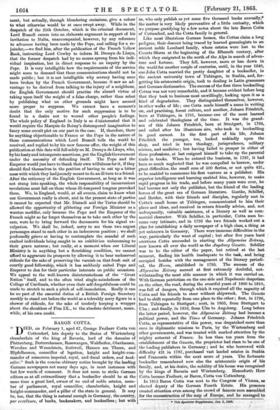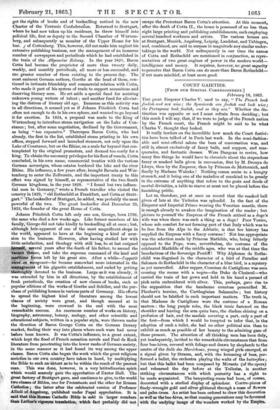BARON COTTA.
" DIED, on February 1, aged 67, George Freiherr Cotta von Cottendorf, late deputy to the States of Wiirtemberg chamberlain of the king of Bavaria, lord of the domains of Plettenberg, Dotternhausen, Rosawangen, Waldhofen, Oberhausen, Wenzlau and Wenzelstein, Rottweil, Hansen am Thann, and Hipfelbeuren, councillor of legation, knight and knight-com- mander of numerous imperial, royal, and ducal orders, and book- seller." Such is the concise obituary notice brought by the leading German newspapers not many days ago, in most instances with but few words of comment. It does not seem to strike German editors as at all extraordinary that a bookseller should be at the same time a great lord, owner of no end of noble estates, mem- ber of parliament, royal councillor, chamberlain, knight and knight-commander, and a pillar of the state in general. It may be, too, that the thing is natural enough in Germany, the country, par excellence, of books, bookmakers, and booksellers ; but with
us, who only publish as yet some five thousand books annually,* the matter is very likely provocative of a little curiosity, which we purpose gratifying by a few notes about the late Baron Cotta of Cottendorf, and the Cotta family in general.
Like most illustrious German houses, the Cottas claim a long pedigree, their descent being traced by learned genealogists to an ancient noble Lombard family, whose estates were lost to the Counts Sforsa at the beginning of the fifteenth century, after which they emigrated to the north of the Alps in search of adven- ture and fortune. They fell, however, more or less down in the world for another couple of centuries, until, in the year 1640, one John Cotta married the pretty daughter of a bookseller, in the ancient university town of Tubingen, in Suabia, and, for- getting his aristocratic origin, took to dealing in Latin grammars and German dictionaries. The success of the first three bookselling Cottas was not very remarkable, and it became evident before long that they took to business most unwillingly, looking upon it as a kind of degradation. They distinguished themselves, however, in other walks of life ; one Cotta made himself a name in writing on, and practising, forest culture, and another, Johann Friedrich, born at Tubingen, in 1701, became• one of the most learned and celebrated theologians of the time. It was the grand- son of this Johann Friedrich, born at Stuttgart, in 1764, and called after his illustrious sire, who took to bookselling in good earnest. In the first part of his life, Johann Friedrich the younger, too, looked unkindly upon the shop, and tried in turn theology, jurisprudence, military science, and medicine ; but having failed to prosper in either of these professions, at last resigned himself to take up the parental trade in books. When he entered the business, in 1787, it had been so much neglected that he was compelled to borrow, under great difficulties, the small sum of 500 florins, or not quite 424 to be enabled to commence his first venture as a publisher. His superior intelligence and learning enabled him, however, to make rapid progress in his trade, and before many years were over, he had become not only the publisher, but the friend of the leading heroes of the great era of German literature. Goethe, Schiller, and Herder, with their friends and disciples, regularly met in Cotta's small house at Tiibingen, communicated to him their plans and ideas, and received in return friendly advice, and, not unfrequently, valuable assistance, of a literary as well as com7 mercial character. With Schiller, in particular, Cotta soon be- came very intimate, and in 1793 the two friends worked out a plan for establishing a daily newspaper of a high class, a thing as yet unknown in Germany, There were immense difficulties in the way, particularly the want of capital ; but after five years hard exertions Cotta succeeded in starting the Allgemeine Zeitung, now known all over the world as the Augsburg Gazette. Schiller was to be the editor of the paper, but retired at the last moment, finding his health inadequate to the task, and being occupied besides with the management of the literary periodi- cal, the Horen, established in 1795. The success of the Allgemeine Zeitung seemed at first extremely doubtful, not- withstanding the most able manner in which it was carried on. With German patriotism on the one side and Napoleonic despotism on the other, the road, during the eventful years of 1800 to 1810, was full of dangers, through which it required all the sagacity of Cotta and his friends to steer without shipwreck. The Gazette had to shift repeatedly from one place to the other ; first, in 1798, from Tubingen to Stuttgart ; next, in 1803, from Stuttgart to Ulm ; and finally; in 1816, from Ulm to Augsburg. Long before the latter period, however, the Allgemeine Zeitung had become a political power, and the Times of Germany. Johann Friedrich Cotta, as representative of this power, was despatched more than once in diplomatic missions to Paris, by the Wiirtemberg and other governments, and was treated with marked attention by the mighty autocrat of France. In less than ten years from the establishment of the Gazette, the proprietor bad risen to be one of the leading publishers in Germany ; and he who borrowed with difficulty 421. in 1787, purchased vast landed estates in Swabia and Franconia within the next score of years. The fortunate bookseller remembered now also the aristocratic origin of his family, and, at his desire, the nobility of his house was recognized by the kings of Bavaria and Wiirtemberg. Henceforth Herr Cotta became Freiherr, or Baron, Cotta von Cottenberg.
In 1815 Baron Cotta was sent to the Congress of Vienna, as elected deputy of the German Fourth Estate. His presence created attention even among the crowd of famous men assembled for the reconstruction of the map of Europe, and he managed to
• Tide Spectator Supplement, Jan. 9, 1863. get the rights of books and of bookselling noticed in the new Charter of the Teutonic Confederation. Returned to Stuttgart, where he had now taken up his residence, he threw himself into political life, first as deputy to the Second Chamber of Wiirtem- berg, and subsequently as member of the Upper House for his bait j of Cottenberg. This, however, did not make him neglect his extensive publishing business, nor the management of an immense number of newspapers and periodicals which he had established in the train of the Allgenieine Zeitung. In the year 1820, Baron Cotta had become the proprietor of more than twenty daily, weekly, and monthly periodicals, all more or less successful, and the greater number of them existing to the present day. The most eminent German authors, Goethe at the head of them, con- tinued in intimate friendship and commercial relation with Cotta, who made it part of his system of trade to support necessitous and deserving literary men. He set aside a special fund for assisting unknown young writers of talent ; and another fund for alleviat- ing the distress of literary old age. Immense as this activity was in all directions, it seemed yet as if Johann Friedrich Cotta had often not enough to do in his own sphere, and wanted to go beyond it for exertion. In 1824, a proposal was made to the King of Wiirtemberg to introduce steam navigation on the Lake of Con- stance ; but, after some negotiation, declined by the Government, as being " too expensive." Thereupon Baron Cotta, who had already, the first in the list, established steam printing in his own offices, stepped forward and launched steamers, not only upon the Lake of Constance, but on the Rhine, on a scale far beyond that con- templated by the original promoters, and deemed too costly for a king. To obtain the necessary privileges for. his fleet of vessels, Cotta concluded, in his own name, commercial treaties with the various German sovereigns, whose estates bordered the lake and the river Rhine. His influence, a few years after, brought Bavaria and Wiir- temberg to enter the Zollverein, and the important treaty to this effect was signed by himself, as representative of the two South German kingdoms, in the year 1828. " I found but two influen- tial men in Germany," wrote a French traveller who visited the country in 1829, " old Rothschild at Frankfurt, and Cotta at Stutt- gart." The bookseller of Stuttgart, he added, was probably the most powerful of the two. The great bookseller died December 29, 1832, the founder of the great House of Cotta.
Johann Friedrich Cotta left only one son, George, born 1796, the same who died a few weeks ago. Like former members of his family, George did not take kindly to bookselling all at once ; but, although heir-apparent of one of the most magnificent shops in the world, appeared to have at the beginning a kind of aver- sion to the business. However, after having studied law with little satisfaction, and theology with still less, he at last resigned himself, several years after the death of his father, to ascend the vacant throne, and take the supreme command of the land and maritime forces left by his great sire. After a while—rappetit vient en mangeant—he became somewhat more interested in the management of his gigantic establishment, and ended by getting thoroughly devoted to the business. Large as it was already, it was extended by him in all directions, by the establishment of fresh periodicals, the creation of new classes of books, such as popular editions of the works of Goethe and Schiller, and the pur- chase of publishing houses in various parts of Germany. His efforts to spread the highest kind of literature among the lowest classes of society were great, and though sneered at in the beginning, were crowned in the end with the most remarkable success. An enormous number of works on history, biography, astronomy, botany, zoology, and other scientific and educational subjects, written in a popular style, were thrown under the direction of Baron George Cotta on the German literary market, finding their way into places where such ware had never before been known. It was Cotta's influence, to a great extent, which kept the flood of French sensation novels and Paul de Kock literature from penetrating into the lower ranks of German society, in the same manner as it had found its way among the upper classes. Baron Cotta also began the work which the great religious societies in our own country have taken in hand, by multiplying the Bible to such an extent as to be within the reach of the poorest man. This was done, however, in a very latitudinarian spirit which would scarcely gain the approbation of Exeter Hall. The great factory of Stuttgart gave, and continues to give, to the world two classes of Bibles, one for Protestants and the other for Roman Catholics ; the latter after the celebrated version of Professor Allioli of Augsburg, published under Papal approbation. It is said that this Roman Catholic Bible is sold in larger numbers than Luther's vigorone translation, which fact probably did not escape the Protestant Baron Cotta's attention. At this moment, after the death of Cotta II., the house is possessed of no less than eight large printing and publishing establishments, each employing several hundred workmen and artists. The various houses are at Stuttgart, Munich, Augsburg, Leipzig, Landshut, and Tubingen, and, combined, are said to surpass in magnitude any similar under- takings in the world. Not unfrequently in our time the names of Cotta and Rothschild are mentioned in conjunction, as repre- sentatives of two great engines of power in the modern world— intelligence and money. It requires, however, no great sagacity to perceive that Baron Cotta can do more than Baron Rothschild— if not more mischief, at least more good.































 Previous page
Previous page